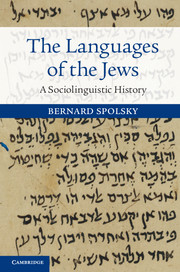Book contents
- Frontmatter
- Dedication
- Contents
- List of maps
- Preface and acknowledgments
- Glossary
- 1 Is Hebrew an endangered language?
- 2 The emergence of Hebrew
- 3 Hebrew–Aramaic bilingualism and competition
- 4 Three languages in Hellenistic and Roman Palestine
- 5 From statehood to Diaspora
- 6 The Arabian and African connections
- 7 The spread of Islam
- 8 The Jews of France
- 9 The Jews of Spain and their languages
- 10 Loter-Ashkenaz and the creation of Yiddish
- 11 The Yavanic area: Greece and Italy
- 12 Jews in Slavic lands
- 13 Linguistic emancipation and assimilation in Europe
- 14 Britain, its former colonies, and the New World
- 15 Islam and the Orient
- 16 The return to Zion and Hebrew
- Appendix Estimated current status of Jewish languages1
- Notes
- References
- Index
3 - Hebrew–Aramaic bilingualism and competition
Published online by Cambridge University Press: 05 June 2014
- Frontmatter
- Dedication
- Contents
- List of maps
- Preface and acknowledgments
- Glossary
- 1 Is Hebrew an endangered language?
- 2 The emergence of Hebrew
- 3 Hebrew–Aramaic bilingualism and competition
- 4 Three languages in Hellenistic and Roman Palestine
- 5 From statehood to Diaspora
- 6 The Arabian and African connections
- 7 The spread of Islam
- 8 The Jews of France
- 9 The Jews of Spain and their languages
- 10 Loter-Ashkenaz and the creation of Yiddish
- 11 The Yavanic area: Greece and Italy
- 12 Jews in Slavic lands
- 13 Linguistic emancipation and assimilation in Europe
- 14 Britain, its former colonies, and the New World
- 15 Islam and the Orient
- 16 The return to Zion and Hebrew
- Appendix Estimated current status of Jewish languages1
- Notes
- References
- Index
Summary
What is the evidence?
My tracing of Jewish multilingualism back to the period of settling in Canaan may well be wrong, and my assumption of knowledge of Aramaic in pre-exilic Judah is also based more on sociolinguistic than biblical or archeological evidence, but all scholars agree that the surrender to Sennacherib and the deportations that followed Nebuchadnezzar’s destruction of Jerusalem in 597 BCE had a major influence in adding Aramaic to the languages of the Jewish people. In one simple view, favored by nineteenth-century scholars, we start with a period of Hebrew monolingualism, then enter, after the Babylonian exile, an Aramaic period, and next have Greek added after Alexander’s conquests; Hebrew lingers as Latin did in the Middle Ages: an artificial variety for writing sacred text. Or, perhaps, we go from a period when Jews lived in a multilingual region, and chose individually to be plurilingual, to a period when the Jewish nation shifted from speaking only Hebrew, with appropriate roles for each of its languages. The big questions that remain undecided are how fast these transitions were and what happened to Hebrew.
There are two major schools of thought, which I might label the multilingualist Hebraists, who believe and argue that Hebrew continued to be spoken until the destruction of the Second Temple or later, albeit in a bilingual or diglossic pattern with Aramaic enriched later by the addition of Greek; and the monolingualists, who assume that Hebrew became a limited artificial religio-literary language, like Latin in the medieval Church. It was this second group, raised in Anglo-Saxon monolingualism, who would ask what language Jesus spoke, ignoring the probability of plurilingualism. My own prejudice, as a sociolinguist happy to watch his grandchildren growing up as comfortable bilinguals, tends to be with the first school, but at the outset I admit it seems hard to reach a conclusion. Many Talmudic discussions end with the simple word Teiku, translated in bilingual editions as “The question remains undecided”, and used in Modern Israeli Hebrew to report a draw in a football match. This will be the only reasonable answer, in the meantime, to many of the questions raised in this book.
- Type
- Chapter
- Information
- The Languages of the JewsA Sociolinguistic History, pp. 35 - 45Publisher: Cambridge University PressPrint publication year: 2014



